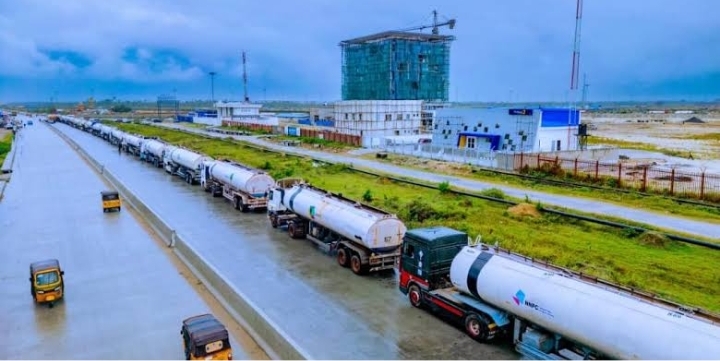The Lagos State Government says rising traffic from articulated trucks on the Lekki-Epe corridor has prompted the enforcement of a technology-based electronic call-up (e-call-up) system.
The Commissioner for Transportation, Mr. Oluwaseun Osiyemi, disclosed this on Sunday in a statement by Mrs. Bolanle Ogunlola, Deputy Director of Public Affairs at the Ministry of Transportation.
Osiyemi revealed that enforcement of the e-call-up system will commence on Monday, June 16, to manage truck movement in the affected corridor.
The News Agency of Nigeria (NAN) reports that the Lekki-Epe axis hosts major investments including the Dangote Refinery, Lekki Deep Sea Port, and key oil and gas infrastructure.
Due to the presence of only one major exit route, Osiyemi noted that rapid industrial growth has intensified congestion in the area.
He said urgent and proactive traffic management measures are required to address the worsening situation on the corridor.
According to him, 360 to 400 trucks currently operate daily, but this figure could increase significantly with full operations at the Dangote Refinery.
The refinery alone could dispatch between 3,000 and 4,000 trucks daily, Osiyemi said, highlighting the need for effective regulation.
He stated that the e-call-up system will help regulate truck movement through structured scheduling, thereby reducing chaos on the roads.
“Truck operators will be required to register online and upload their Authority to Load (ATL) documents for verification.
“Only validated and cleared trucks will access designated parks, awaiting an electronic call-up notification before proceeding to their loading points,” he said.
In support of the initiative, the Lekki Estates Residents and Stakeholders Association (LERSA) backed the Lagos State Government’s reintroduction of the e-call-up system.
Alhaji Sulyman Bello, President of LERSA, said in an interview that the implementation of the system is an emergency solution that cannot be delayed any further.
He described it as vital to safeguarding lives, properties, businesses, and infrastructure across the Lekki-Epe corridor.
Bello said the initiative would prevent a repeat of the chaotic Apapa traffic crisis and its associated infrastructure damage.
“It has to be emphasised that our children, wards, spouses, neighbours, and stakeholders would have been at the terrible receiving end of unregulated truck/tanker operations within the Lekki Peninsula,” he stated.
He commended Governor Babajide Sanwo-Olu and the Ministry of Transportation for what he called a bold and necessary intervention.
Bello warned against any attempt to undermine or sabotage the system, which he said was designed to ensure the safety of residents and reduce environmental degradation caused by unchecked trucking activities.
He noted that residents have endured long hours in traffic, increased accidents, and damage to public infrastructure due to heavy trucking.
“Having children in school buses spend three hours in the morning and four hours on the homeward journey has become a reality that perpetually saddens parents,” he added.
Bello called on logistics and petroleum sector stakeholders to support the initiative through dialogue, not disruption, and allow the June 16 rollout to proceed while resolving any grey areas.
He reiterated LERSA’s commitment to working with all stakeholders to ensure the success of the system and to build a safe, efficient, and economically viable transportation framework in the Lekki-Epe axis.
Commissioner Osiyemi added that the e-call-up system is expected to reduce illegal parking, improve traffic flow, and protect road infrastructure.
He described it as a bold step toward modernizing logistics and transport management in Lagos, particularly in rapidly developing areas like Lekki-Epe.
He urged all stakeholders to voluntarily comply to ensure the system’s success and reduce traffic-related challenges in the region.

